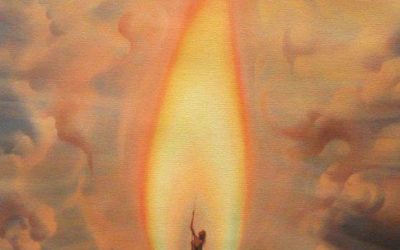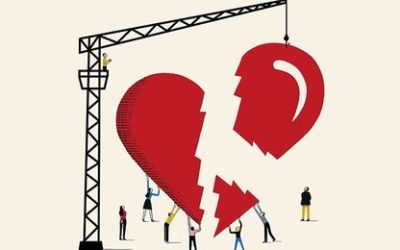 I began writing this piece a couple of months ago, gently tiptoeing back toward finding the words for what had been living tenderly unexpressed in my heart.
I began writing this piece a couple of months ago, gently tiptoeing back toward finding the words for what had been living tenderly unexpressed in my heart.
Still emerging from what has been, without question, the most challenging three-year passage of my adult life, this notion of making medicine of what breaks us isn’t theoretical for me, nor merely based in past revelation. It’s a deeply present inquiry, intimately interwoven with the breath and walk of my every day.
If we are living fully and deeply, then sooner or later our lives will include the kind of difficult life curriculum designed to break, disillusion, sober, and humble us. And yet, it is through this very breaking of core identity—the loss of who we thought we were—that we are given a chance to come home to who we truly are, and to the love we are here to live.
What does it even mean to make medicine—of our personal and collective trauma, our heartbreak, our disappointment, our failure, our devastating loss? For me, in the simplest way, it means to allow what breaks me (and us, collectively) to ultimately deepen, evolve, wisen, and open me wider to life and to love.
One could argue that medicine-making is a given—a natural aspect of aliveness, synonymous with learning, growth, and evolution through the inherent challenges of life. That it takes care of itself. That making medicine is not something we need to do.
I can see the truth in this perspective.
And yet, in fifty-one years of life—as someone devoted to actively making medicine of the hardest things—I remain fascinated and inspired by the choice, will, maturity, and personal responsibility involved in how we make medicine of what breaks us.
This is a devotion I’ve tended and fostered not only in myself, but in my kids, and in the precious humans who come to me for counsel and healing.
I am moved by countless stunning examples of our human capacity to alchemize life’s fiercest tests, trials, and living nightmares into gold. I’m thinking now of Ram Dass, whose masterful spiritual transmission only deepened in the wake of his debilitating stroke. I’m thinking of Anne Frank, whose life, legacy, and voice embody this very alchemy—transforming horror and isolation into empathy, wisdom, and courage.
This alchemical journey is one of my favorite threads to track in the lives of my closest friends—this sacred witnessing of one another’s hard-won transformation. What an intimately inspiring privilege it is to behold our soulmates transmuting their most persistent patterns of pain into an essential part of the gift they’re here to give.
And yet, what I’ve also witnessed—both within myself and in those around me—is that the cost of refusing this process often reveals itself in the festering wound of heartache, the bitterness of resentment, the obsessive loop of regret, the quiet apathy woven into depression, the pervasive grip of anxiety, and the desperate coping strategies of addiction and self-harm.
This is the place where the acute, innate suffering of life—trauma, illness, betrayal, loss—has the potential to catalyze our soul’s evolution, but instead stagnates into chronic suffering, sustained by the limited lens we carry and the painful narrative we unconsciously, dutifully serve.
It is this very capacity to perceive our life curriculum—meaning life’s greatest lessons, tests, and trials—through a lens that is curious and eager to make medicine of it, that ends up being one of the most sacred keys to liberation.
On the notion of making medicine of our deepest struggles and challenges, modern psychology might call this post-traumatic growth—the process by which our pain becomes a portal to deeper empathy, purpose, and presence.
In many indigenous traditions, trauma, illness, loss, and rupture are seen as sacred rites of passage—initiatory gateways that beckon the soul to evolve. These passages are honored for their unparalleled capacity to carve us into something truer—if we are willing to surrender and let the process undo what no longer serves.
Just like Snake, we must shed our skins again and again, relinquishing all we thought we were. This undoing is not pathology. It is the remedy. It is soul maturation in motion—the continuous work of becoming, of homecoming, of re-membering who we truly are.
The notion of making medicine is not intended as some pollyannish or sentimentally optimistic perception—not designed to bypass or spiritualize what is inherently heartbreaking and unjust in our lives and in our world.
In fact, we can only truly alchemize the pain and horrors we face through our willingness to meet it all fully and unsparingly. Not a transcending, but rather a descending—fully and completely—an opening all the way into the heart of our own pain.
Making medicine of the mess of our lives doesn’t make us good. It does not turn us into better people. It does not elevate us. Nor is it an inoculation that somehow immunizes us against further challenge. But it certainly diminishes and can even annihilate suffering born of identification with our pain. It loosens the shackles that bind us within a narrative of blame, self-hatred, terror, and shame.
My beloved son, sixteen years old now, has been profoundly initiated in recent years by the brutal teachings of mental health crisis, trauma, and recovery. His eyes shine these days with authentically hard-won self-love and self-respect. Just now, he glanced over my shoulder as I sat writing this piece at our kitchen table. Vulnerably, I let him read what I’d written so far.
He placed his strong, warm hand on my back, leaned down and kissed my cheek, as he said: “Yeah, Mom. Sometimes the greatest medicine we can make is just to not take for granted the gift of feeling good—our health, our stability, our ability to change our habits. I feel like the biggest medicine for me today is just being grateful and cherishing my own life.”
Oh my god. To hear him say this now, knowing the depths he has traveled into his own pain to come to the solidity of this knowing. Every parent of a child who has suffered can imagine.
There’s a very fine line between suffering and revelation, shame and compassion, resentment and self-responsibility—and that line lives in what we are willing to make of our pain, our challenges, our failures.
And—sometimes the greatest medicine that comes from a particular hardship is simply the humbling it delivers. I’ve spent my whole life paying close attention, and what I’ve noticed is this: many of life’s most excruciating passages seem to exist for no other reason than to humble us, to disillusion our false identities or cherished outcomes, and to illuminate what matters most.
Humbling is not usually something we wish for, (even if we have no problem wishing it upon others!) but it is always something we can use more of. And life does an excellent job of humbling us.
My first grand humbling came in 1975, at the age of 18 months, in the form of Eosinophilic Meningitis that could have killed me, traumatized my 23-year-old parents half to death, and left me with debilitating neurological issues that monopolized my childhood experience—while simultaneously giving me invaluable physiological, psychological, and spiritual material to work with as I became a young healer.
When we are truly humbled by life, compassion and empathy naturally follow. If we have walked with seemingly unbearable flaw, shame, and self-loathing, we know how to recognize it in another. And if we’ve learned to love ourselves in those tender, hidden chambers of unworthiness, then we know how to love others there too.
As we turn toward the sword of life, and allow it to pierce our hearts cleanly, we inadvertently discover that the very annihilation we’ve avoided is what brings us most deeply home—to life, to love, to the living breath of our shared humanity.
But—let’s face it. It’s not always the right time for medicine-making. When we are still in the thick of it, barely staying above water, unable to see even the next step ahead in the dark, our only task is to be as present as we can be—to meet what life is bringing with honesty, courage, and an abundance of mercy.
I’m still recovering in ways from this most recent, grueling yet revelatory season of my life, walking beside my son through his harrowing initiation into manhood.
In retrospect, I can recall the invaluable teachings gathered while deep in the throes of hell. I was being schooled—by my own unrelenting devotion, by love’s unflinching boundary, and by the excruciatingly vulnerable teachings of ultimate powerlessness. But it’s only now, safely on the other side of acute terror and trauma, that I can truly reap the rewards of that medicine.
When we are in the thick of the battle, standing at the edge of potential loss, or crumbling under the blow of actual loss, it’s rarely the moment to reflect on the sacred teachings at hand.
Life is a muddled, messy mess much of the time—full of grief and unexpected disappointments. We needn’t rush to turn the mess into medicine.
Even if we could rush it, it’s wiser to be where we are—to linger in the awful ache of what’s utterly unresolved. The excruciating not-knowing. Better to remain in the unavoidable “why-the-fuck-is-this-happening” part of the chapter until it passes naturally, like a summer storm through the sky.
When life’s ruthless blows bring us to our knees, I’ve discovered it’s beneficial to stay there awhile. There’s something that can only be discovered when we’ve lost all composure, all capacity to rise above the pain. And many good prayers are born on our knees—some of our very best prayers.
I’ve noticed there’s a sacred reckoning, an essential emptying out, that only comes when we stop hoping we’ll ever get out of this thing—this devastating grief, this financial crisis, this attack, this betrayal, this bind, this diagnosis—all in one piece.
There’s a time for acute trauma (whether we like it or not) and the long season of recovering the nervous system, heart, and soul from the injuries incurred. PTSD is real, and it can be debilitating and consuming.
Less than a year ago, my already delicate nervous system was injured by all we were navigating. The smallest things could trigger waves of nauseating panic. In moments I was taken over by uncontrollable shaking, or uncontrollable weeping. I would replay the traumatic events in my mind, as if trying desperately to integrate them.
We must take whatever time we need to be in a million broken pieces—not knowing if we will ever find our way back to what’s whole.
And we must ask for help—from those seen, and unseen. We must courageously seek out those who can hold some of it with us. Because it’s far too much for any one of us to carry on our own.
A clear and simple prayer from the heart of the darkest night is enough to set the medicine in motion. Here’s my favorite, simplest prayer for the rock-bottom, deepest, darkest, scariest moments: Dear God, Help. Please help me. I’m at a loss. I need help please. Please… and thank you.
On several occasions, still deep in the thick of it, wading through the shitstorm of some harrowing passage, I’ve begged to skip ahead to the part where I’m already wiser, clearer, more still, and more useful for it all.
Wanting to get to the part of the script where the heroine’s eyes shine with the treasure she’s gleaned—where it’s finally, undeniably clear why we had to be tested and trialed in such brutal ways. But it can’t be forced.
The making of medicine comes organically, once we’ve made it to the other side. Once we’re no longer drowning, and we’ve found our breath again. Once we can crawl back to the altar of our lives, light another candle, and open to what our hearts have to tell us—about the gems that have been gathered.
We empty our pockets from the journey and our eyes widen in astonishment—to see all the authentic beauty and clarity we didn’t even realize we’d picked up along the way.
Sometimes revelation and breakthrough are instantaneous. Other times they arrive gradually, like a wisp or scent of something just out of reach.
One moment, we’re weeping in our beds in the middle of the night, not knowing how we’ll survive this dark passage. Or kneeling at the altar in our living room, burning enough sage to set off every smoke alarm, fervently praying for help.
And then—maybe a week, or a month, or a year, or three years, or ten—suddenly, a shift occurs. We find ourselves still at the altar. But open now. New. New as the quietest golden light of dawn.
Not like we were before the breaking, no. Maybe broken still, in some ways. Most definitely scarred from the wear and tear of living.
But new. Letting love work with the scars and crevices—like a river bending to include the changing earth, washing generously over and through the cracks, softening all the sharp places.
So no, no need to rush. It takes care of itself if we let it.
But at the same time, let us beware the deeply human tendency toward needless postponement. Let’s resist the temptation to stay stuck or frozen in the unfamiliar aftermath of a life irrevocably changed.
I’m not talking about the wild, consuming grief that rightfully follows true loss—the sacred, trustworthy grief that carries its own wise and necessary timing.
I’m talking more about the stubborn unwillingness to be free of obsessing over the person we loved who then left us, or the person we loved and then left.
Or that tendency we might have of kicking ourselves endlessly for our poor discernment—the wrong investment, the person we shouldn’t have slept with, the good thing we sabotaged, the wrong thing we stayed in too long.
Or dwelling in self-punishment for the mistakes we’ve made with the people we love most. That’s a big one. Sometimes self-punishment is so subtle, we don’t even notice we’re doing it.
We don’t need to wait forever to take a good, hard look at what this dark night, failure, illness, loss, or grievance has been teaching us. What could you have learned only by walking through this particular fire, this initiation, only by receiving these excruciating mirrors?
The lens of perception is where we begin, followed by the narrative we carry, and finally, the way we are willing to integrate and embody the medicine of our life’s teachings.
I’ve never experienced a global moment like the one we’re facing now, nor do I know if anything quite like it has ever come to pass.
But I do know what it is to live through life-or-death moments—times of devastating fear, uncertainty, and loss, within the contours of my own small and privileged human life. And I believe that to the extent we’ve learned how to meet personal horror with courage, commitment, and surrender—these are the very same skills being called upon now in this larger collective moment.
The skills we’ve honed through our most humbling initiations—the ones that brought us to our knees, taught us how to pray, and cultivated in us a devotional love for inner stillness— these are the very skills we can wisely draw upon now.
So that the treasure we gathered in the pit of our despair becomes an offering—a rare reflection of clarity, sanity, and remembrance for everyone we meet.
These gifts, this hard-earned medicine—born from living through what broke us, are what directly informs our capacity to meet ourselves, and all our relations—with compassion, truth, revolutionary joy, and unrelenting love.
© Jesua Wight, July 6th, 2025
This essay was published this morning in my free Substack – Meeting Life, a space of sacred storytelling, inquiry, and devotion. Would love you to follow me there!


